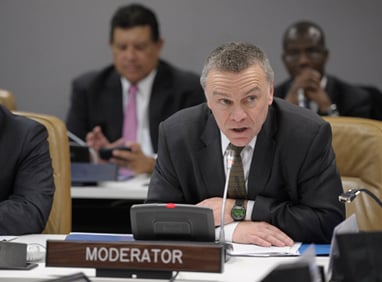|
First Set of Global Standards for Citizen Election Monitors is Launched at the UN

Craig Jenness, director of the U.N. Electoral Assistance Division, speaks at the launch of the global principles. Photo by the U.N.
Global standards for citizen election observation were established for the first time on April 3 when leaders representing 150 citizen election monitoring groups came together at the United Nations to launch a declaration of principles and code of conduct.
The declaration lays out rights and responsibilities for citizen monitors, from their rights of access and accreditation to their duties to remain nonpartisan and share their findings with the public. The standards were developed by the Global Network of Domestic Election Monitors (GNDEM), which includes 150 member groups from 65 countries on five continents that have mobilized three million citizen observers. GNDEM was created in 2009 as the first global network to aid collaboration among citizen election monitoring groups.
Representatives from more than a dozen intergovernmental and international nongovernmental organizations attended the ceremony, along with former Secretary of State Madeleine K. Albright, NDI's chairman. The launch event was hosted by the U.N. Electoral Assistance Division and co-organized by NDI. The initiative is funded by the U.S. Agency for International Development and the National Endowment for Democracy.
"The declaration of global principles provides both a practical and ethical structure for citizen election monitoring," Albright said. "I hope that we will continue to see more countries and organizations endorse and implement the declaration of global principles and the code of conduct."
The launch marks an important milestone in the history of nonpartisan citizen election observation. Since 1986, at least 90 countries have benefited from the efforts of nonpartisan citizen election monitors, who have built confidence and participation in the electoral process.
|
|
At NDI's Albright Award Luncheon, Rep. Wasserman Schultz Said Women's Voices Are Crucial to Democracy
"Too often, women don't speak up," said Rep. Debbie Wasserman Schultz (D-FL) while delivering the keynote address at NDI's March 22 Madeleine K. Albright Grant luncheon. "But women's voices are crucial to democracy." Watch the speech»
A representative of the Women's Discussion Club of Kyrgyzstan accepted the grant and award from Albright. The club is "precisely the kind of innovative and grassroots organization that can help to make real democracy possible,” Albright said. Read more»
Programs Promote Full Inclusion of Women, Youth and the Disabled in the Political Process
In Kosovo, women parliamentarians met with journalists to discuss how women are portrayed in the media. And they called on the media and political parties to choose women more often to discuss "hard" issues such as the economy and foreign policy. Read more»
In Yemen, where the participation of young people will be crucial to the success of the country's democratic transition, the two-year-old Cross Tribal Youth Council has helped reduce reported conflicts in local schools by more than 300 percent. The council also led the resolution of 12 broader tribal conflicts and trained students and parents on conflict mitigation techniques. Read more»
A new civic education film recently released in Nigeria asks the question, "I Voted, Now What?" It was made by the Youngstars Foundation, a Nigerian nonprofit organization, with the goal of encouraging young people to stay involved in the political process between elections. Read more»
It took many years, but disabled citizens in Macedonia now have a legal right to equal treatment under the law, thanks in part to an advocacy campaign led by Poraka, a nationwide, nongovernmental organization representing more than 20,000 Macedonians living with disabilities. Read more»
Responding to Citizen Concerns, MPs Work to Expand Health Care in South Sudan
Doctors and nurses from a U.N. hospital in South Sudan are treating patients in communities outside the capital that previously had no access to health care. The initiative grew out of a townhall style meeting that allowed residents to address issues directly with elected officials. Read more»
|
|
Observing Elections in Burma, Algeria, Nigeria
NDI and the International Republican Institute sent witnesses to the April 1 by-elections in Burma at the invitation of the U.S. government. One representative from each institute visited the country to study the conduct and significance of the polls. Read more»
An international pre-election assessment in Algeria found that election officials still had time before May 10 parliamentary elections to make modest procedural changes that would increase transparency, including opening up the tabulation process to observers and clarifying the accreditation process for domestic monitors. Read more»
Project Swift Count, a domestic election observation coalition in Nigeria, recently undertook parallel vote tabulations for five gubernatorial elections. The group's quick counts tracked closely with the results of all five polls. Read more»
Political Parties Look to the Future in Libya, Sierra Leone
For 42 years, political parties were outlawed in Libya under Muammar Gaddafi. Last month, representatives from 33 of the country's new political parties met to discuss a new law that will govern Libya's first election in nearly 50 years. Read more»
In Sierra Leone, all eight of the country's registered political parties have signed an "Open and Safe Elections Pledge" to discourage their supporters from engaging in election-related violence. Read more»
New Public Opinion Research in Georgia, South Sudan
A new public opinion survey shows that jobs, territorial integrity and affordable healthcare are the top three priorities for Georgian citizens, while concern about rising prices and inflation has dropped. Read more»
In South Sudan, new focus group research finds growing pessimism about the direction of the new country, which has seen an increase in tribal violence and a tenuous economic situation. Read more»
|

